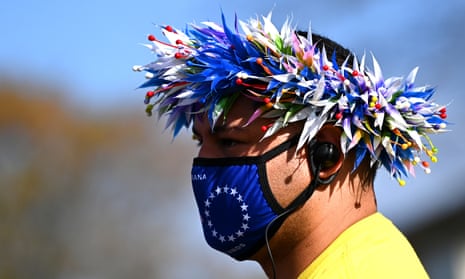And so with that, a confusing 20-minute monologue in the Beehive theatrette, New Zealand’s virus-beating elimination strategy is over. As the Delta variant’s “tentacles”, to borrow the prime minister’s description, creep past the Auckland border, potentially wrapping themselves around parts of the Waikato, the government will no longer aim to cut the monster off at its head with tough alert level four restrictions. Instead public health officials will move to a suppression strategy aiming “to contain and control the virus” while we vaccinate our way out of the pandemic. At its simplest, Jacinda Ardern’s message from the threatrette was vaccinate, vaccinate, vaccinate.
For 18 months New Zealanders were living life as if there were no pandemic. We were gathering outdoors and indoors in the thousands, mask mandates were literally a foreign concept, and business and public services were operating more or less as normal. We were watching governments that let the virus rip with a good dose of horror and, if we’re honest, a modest dose of smugness. And so yesterday’s announcement – that the virus will remain resident in this country – feels like a form of whiplash. Only two weeks ago the prime minister stood in that familiar theatrette and told the country returning to zero cases was still the goal.
What could possibly change within those two weeks?
Well, the first change is obvious. This isn’t just a Covid-19 outbreak – it’s a Delta outbreak, more transmissible than the original variant. Level four and level three restrictions were, in hindsight, enough to contain and control the virus with contact tracers only one or two steps behind the spread. But those two restrictive alert levels were apparently suffering from the law of diminishing returns, keeping cases low without eliminating them entirely. The choice was to either persist in those restrictive levels with only the possibility of elimination, and possibly eroding the social licence for lockdown, or to change the game.
The prime minister and her cabinet, considering the second change within those two weeks, opted to change the game. Vaccination levels are increasing, giving a good number of Aucklanders gold-plated protection against contracting and spreading the virus. But hidden within that vaccine drive is an alarming inequality: only 57% of Māori have had their first jab and only 73% of Pacific peoples. That compares against 80% for Pākehā and 95% for Asian peoples. In the current outbreak Māori and Pacific peoples make up 83% of all cases. This confirms what we already know: that Covid-19 is a disease of the unvaccinated.
That means, in New Zealand, absent a dramatic change in vaccination rates, Covid-19 risks becoming a disease for brown people. “I think it is going to slam into those groups,” Māori GP Dr Rawiri Jansen told the New Zealand Herald, referring to the 83% of Māori and 76% of Pacific peoples aged 12 to 39 who aren’t fully immunised. Left to its own devices Delta spreads from one person to six, to 36, to 216, to 1,296 and so on and so on. If Ardern takes a step back on current restrictions – say, returning to level two too early – this is the gamble: that the virus could continue its spread through young, brown communities.
That would amount to an unconscionable gamble. The current outbreak is already following New Zealand’s various lines of inequality, burrowing deep in the transitional housing community and gangs. That public health crisis is exposing decades of investment decisions that weren’t made: successive governments didn’t invest enough in hospitals and their staff (nurses were planning to strike in September only for Delta to delay their appointed time); successive governments didn’t invest enough in public housing (the virus is ripping through overcrowded Māori and Pacific households); and successive governments didn’t invest enough in an inclusive social policy (what makes enforcing parts of this outbreak difficult is the virus’s spread in the gang scene).
Ardern’s perpetual struggle is transforming her care and compassion into public policy. Thus, the contradiction where she thrives in a crisis yet falters in its aftermath. The prime minister rightly won praise for her deeply human response to the Christchurch terror attacks in 2019. But in the two years after the attack, as the victims and their families suffer mental anguish, Ardern has repeatedly refused to intervene and grant those sufferers support under the government’s accident compensation scheme. It’s a baffling failure, given the commitments she made to the Muslim community, yet it demonstrates in micro what we could witness in macro: that the prime minister’s personal care and compassion do not always align with her public policy decisions.
And so the contradiction reasserts itself. In 2020 the prime minister built deep trust and understanding with New Zealanders, asking everyone to do their bit to eliminate the virus. “Stick to your bubbles.” “Break the chain.” Her crystal-clear communication and elimination strategy took Labour to a majority government at last year’s election. But as of Monday that clarity and certainty is gone. Bubbles can (seemingly) merge. The chain of transmission can (apparently) continue, granted on a short leash. In the context of New Zealand’s stubbornly unequal vaccination rates that now means we are no longer asking every New Zealander to do their bit.
Instead, we are appealing for particular group sacrifices. The homeless, people in gangs, and the unacceptably large number of Māori who are not vaccinated will – absent a dramatic change in government vaccine strategy – be the ones living with the virus.
Morgan Godfery (Te Pahipoto, Sāmoa) is a senior lecturer at the University of Otago and a columnist at Metro
